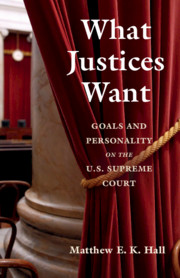Book contents
- Frontmatter
- Dedication
- Contents
- List of Figures
- List of Tables
- Acknowledgments
- 1 Who They Are and What They Want
- 2 Goals and Personality
- 3 Measuring Justice Personality
- 4 Agenda Setting
- 5 Opinion Assignments
- 6 Intra-Court Bargaining
- 7 Voting on the Merits
- 8 Separate Opinions
- 9 Behind the Black Robes
- Appendix A Agenda-Setting Analysis
- Appendix B Opinion Assignment Analysis
- Appendix C Intra-Court Bargaining Analysis
- Appendix D Voting on the Merits Analysis
- Appendix E Separate Opinion Analysis
- Notes
- Index
3 - Measuring Justice Personality
Published online by Cambridge University Press: 22 August 2018
- Frontmatter
- Dedication
- Contents
- List of Figures
- List of Tables
- Acknowledgments
- 1 Who They Are and What They Want
- 2 Goals and Personality
- 3 Measuring Justice Personality
- 4 Agenda Setting
- 5 Opinion Assignments
- 6 Intra-Court Bargaining
- 7 Voting on the Merits
- 8 Separate Opinions
- 9 Behind the Black Robes
- Appendix A Agenda-Setting Analysis
- Appendix B Opinion Assignment Analysis
- Appendix C Intra-Court Bargaining Analysis
- Appendix D Voting on the Merits Analysis
- Appendix E Separate Opinion Analysis
- Notes
- Index
Summary
A challenging obstacle to studying personality on the Supreme Court is developing valid and reliable measures of justices’ traits. Traditionally, psychologists measure personality traits by administering a questionnaire that “consists of a list of adjectives [e.g., ‘temperamental’] or phrases [e.g., ‘Sometimes I do things on impulse that I later regret’] and asks the respondent to rate how well each adjective or phrase describes the individual whose personality is being rated – typically the respondent.” Unfortunately, this approach is impractical for measuring the personalities of political elites, such as Supreme Court justices, because it is often infeasible to gain access to justices or close informants (especially for those who are deceased). Moreover, justices and their close informants may be especially susceptible to socially desirable responding (i.e., reporting overly positive descriptions) for fear of damaging the justices’ reputations.
Therefore, instead of using questionnaires, I employ estimates of the justices’ personality traits developed in collaboration with Gary Hollibaugh, Jonathon Klingler, and Adam Ramey. We estimated the justices’ personality traits using a textual analysis program called the Personality Recognizer. The use of language to capture individual differences (among various psychological constructs) has been validated in a series of experiments using Linguistic Inquiry and Word Count (LIWC) and other computerized textual analysis methods.4 Similarly, the Personality Recognizer was developed by Francois Mairesse and colleagues using James W. Pennebaker and Laura L. King's corpus of over 1.9 million words from laboratory experiments.5 By comparing written essays to self-assessed personality ratings, the program's creators trained machine learning models to accurately estimate personality scores for each of the Big Five factors based on written language. In other words, individuals with certain personality traits tend to use certain types of language; therefore, a person's language can be used to estimate their personality traits. For example, the use of third-person nouns and references to people are positively associated with extraversion, while words related to occupation, work, and school, as well as prepositions, future tense verbs, and words longer than six letters, are all associated with conscientiousness.
- Type
- Chapter
- Information
- What Justices WantGoals and Personality on the U.S. Supreme Court, pp. 35 - 49Publisher: Cambridge University PressPrint publication year: 2018



